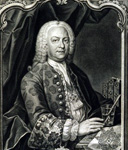Georg Bernhard Bilfinger

Philosopher, mathematician
Born: Cannstatt, Germany - 23 January 1693
Died: Stuttgart, Germany - 18 February 1750
A German theologian who, as a student at the University of Halle, became a disciple of the teachings of Christian Wolff and Gottfried Leibniz, Georg Bilfinger worked as a professor of mathematics and philosophy at Halle and Tubingen Universities, but found himself increasingly in conflict with his conservative religious colleagues at the latter. On Wolff's recommendation, he was invited to St. Petersburg, to work at the Academy of Sciences, recently established by Peter the Great.
At the first public session of the Academy, on 27 December 1725, Bilfinger gave a lecture on experimental physics in Latin. During his five years in St. Petersburg, he was also tasked with designing a school curriculum for the young Emperor Peter II, and with writing for him a textbook of modern history. However, Bilfinger again rowed with his colleagues at the Academy and at St. Petersburg University, and he left Russian at the end of his contract in 1731. He returned to Tubingen, where he was appointed professor of theology, and became a close adviser to Carl Alexander, Duke of Wurttemberg.
He continued to correspond with the Petersburg Academy of Sciences, which published articles on his later areas of interest, botany and fortifications. In 1740, Empress Anna Ioannovna awarded him a prize of 100 rubles for his inventions in the latter field.

